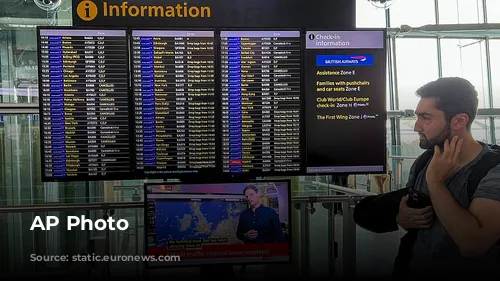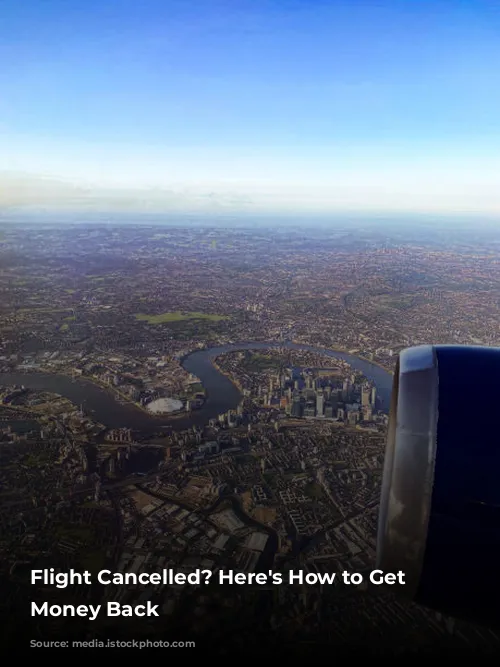Flight disruptions are common and can happen for various reasons, including strikes, technical issues, bad weather, or crew shortages. While frustrating, airlines have a “duty of care” to assist passengers during these situations. This means they must provide support and compensation when flights are cancelled or delayed.

Understanding Your Rights
When flights are cancelled due to “extraordinary circumstances”, such as air traffic control issues, airlines aren’t liable for compensation. However, they still have a duty to help you.
This duty includes offering you a choice between a full refund or an alternative flight. If you choose the latter or your flight is delayed, the airline is responsible for providing the following at the airport:
- Food and drinks: Airlines usually offer vouchers.
- Communication: This often involves reimbursing call costs.
- Accommodation: Provided if your flight is re-routed the next day, typically at a nearby hotel.
- Transport: To and from the accommodation (or your home if feasible).
Airlines are obligated to provide these essentials until you reach your destination, regardless of the delay’s duration or cause.
“If you are still waiting to travel, airlines have a responsibility to take care of you while you wait,” explains Rob Bishton, Joint-Interim Chief Executive of the UK Civil Aviation Authority. “This means providing you with meals, refreshments and hotel accommodation. If airlines cannot do this, you can organise your own and claim the costs back.“
How Much Can You Claim?
Before rushing to book a hotel, inform the airline representative as they may offer accommodation. If you’re provided with vouchers, you have a good idea of how much you can spend.
In other cases, you may need to pay yourself, particularly during large-scale disruptions. However, you are entitled to “reasonable” care and assistance.
Unfortunately, “reasonable” is subjective. Airlines don’t specify an exact amount. Common sense should prevail – you wouldn’t expect reimbursement for a five-star hotel if your flight from Gatwick is delayed.
However, some situations are more challenging, like when the only remaining accommodation is expensive or you need to pay for a taxi due to a lack of nearby options. These expenditures are likely justified as “reasonable,” but the uncertainty can be stressful.

Getting Your Money Back
Keep every receipt! If you pay for anything yourself, including replacement flights or hotels, keep every receipt and ensure your claim isn’t excessive.
To make a claim, contact the airline directly before turning to third-party organizations. This is crucial to avoid potential rejection due to violation of their terms and conditions.
Most airlines have claims options on their websites.
The CAA advises passengers to “clearly present your case, include all relevant information, and provide evidence of your flight.”
Your claim should include:
- Contact details: Full name, address, email, and phone number.
- Passenger information: Names and addresses of all passengers.
- Disruption details: Location and nature of the disruption.
- Delay duration: How long the delay lasted.
- Airline staff contact: Names of any airline staff you spoke to.
Supporting documents, like receipts, tickets, boarding passes, and booking confirmations, will strengthen your claim.
The Civil Aviation Authority provides a helpful guide to making claims: [link to guide].

What If Your Claim is Rejected?
If the airline rejects your claim, you have several options:
- Alternative Dispute Resolution (ADR): Consider referring your complaint to an ADR body like the Centre for Effective Dispute Resolution (CEDR) or AviationADR. These third-party organizations can help you argue your case.
- Civil Aviation Authority (CAA): If your airline isn’t part of an ADR scheme, you can escalate your complaint to the CAA.
- Small Claims Court: This option is time-consuming and stressful. Only consider it after exhausting other avenues. Information on court claims can be found here: [link to information].
Remember, persistence and knowledge are key! Airlines may initially reject your claim, but if you’re eligible under EU laws, don’t hesitate to appeal the decision.
In March, consumer advocacy organization Which? found that airlines owe passengers £4.5 million (€5.2 million) from outstanding County Court Judgments (CCJs). This underscores the importance of pursuing your rights and holding airlines accountable.
By being informed and prepared, you can increase your chances of receiving the compensation you deserve for flight disruptions.










